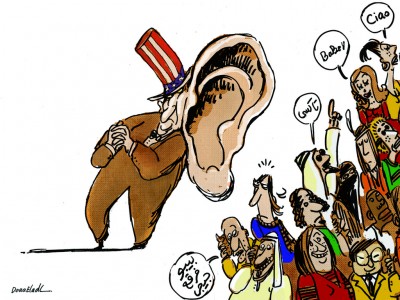Last Saturday, the Canadian government announced it would put proposed online surveillance legislation temporarily “on pause” following sustained public outrage generated by the bill. Since its introduction two weeks ago, Canadians have spoken out en masse against Bill C-30, the Canadian government’s latest attempt to update police online surveillance powers. As currently drafted, the bill represents a dramatic and dangerous attempt to leverage online service providers as agents of state surveillance.
The bill introduces new police powers that would allow Canadian authorities easy access to Canadians’ online activities, including the power to force ISPs to hand over private customer data without a warrant. Adding insult to injury, the proposed legislation would also pave the way to gag orders that would prevent online service providers from notifying subscribers that their private data has been disclosed—a move that would make it impossible for users to seek legal recourse for privacy violations. C-30 is the misshapen offspring of the Cybercrime Convention. Countries have been using this treaty as an excuse to invade citizens’ privacy for years since it was first opened for signature in 2001. Many of these new surveillance powers go far beyond the Convention’s intended levels of intrusiveness.
The bill has inspired Canadian netizens to unleash the full creative force of the Internet in voicing their concerns. They generated creative rants, parodies, videos, t-shirts, LOL memes, and even a hashtag where Canadians tried to save the Government the trouble of increasing online surveillance powers by telling Public Safety Minister Vic Toews “everything.” The proposed legislation has also attracted widespread condemnation from privacy experts, Privacy Commissioners (including specific concerns from the Federal and Ontario Commissioners, as well as general concerns on behalf of all Canadian privacy officers collectively), telecommunications companies, major Canadian newspapers, all opposition political parties, and over 115,000 Canadians who, to date, have signed an online petition against Bill C-30 hosted by OpenMedia.ca.
Widespread condemnation of this bill comes in spite of months of obfuscation by the Canadian government. The government has consistently insisted that the bill does no more than apply existing surveillance capacities to the online world and that, regardless, it's main focus is on child pornography. Matters came to a head a few weeks ago when Minister Toews introduced Bill C-30 and proclaimed that all those opposed to the legislation were “with the child pornographers.” In a last minute change, Bill C-30 was even dubbed the “Protecting Children from Internet Predators Act”—this is in spite of information gathered via an access to information request by Canadian reporter Sarah Schmidt that demonstrated, in the Government’s own internal justifications for the legislation, that the powers in question are actually needed for non-criminal investigations, not child pornography.
Rhetoric aside, Bill C-30 poses serious threats to online privacy. As the majority Canadian government is not likely to give up on this proposed legislation, it is important for Canadians to keep the pressure on! We will discussing these issues in greater deal in our second post on this topic. For now, we urge supporters to join the over 115,000 Canadians who have already signed the stopspying.ca petition against Bill C-30. You can also write a letter to your MP using the Ontario Information & Privacy Commissioner’s letter writing tool.
Stay tuned for additional updates on Bill C-30:
This article has been co-written by Katitza Rodriguez and Ann Harrison from the Electronic Frontier Foundation




3 comments
Our government has failed us! Not only the Conservatives but the NDP and Liberals! It’s time Canadians take Canada back! Shout out for changes in the government! Changes that will put the power back in the hands of the people! We need laws that allow us to force referendums on the politicians when they get out of hand and laws to punish the politicians for when they go to far! The first politician we should hold accountable is Vic Toews. Just in case you forgot what you did, Mr. Toews, you are a liar! You lied to the people of this country, now you should pay the price.
http://www.youtube.com/watch?v=Ia54A5B7auY
http://www.cananon.info
http://www.youtube.com/user/OperationVicTory
The result is a relentless legal attack on branded drugs.
U.S. Expanding Cross-border Police Integration With Canada & Asset Forfeiture Sharing
Concurrent with Obama’s proposed law legalizing and expanding cross-border police integration in North America, Canadians earlier this year discovered introduced (Commons Bill C-30 touted to protect children on the Internet—would also give any Canadian police officer—without a warrant—the power to request Internet service providers turn over customers’ information (see section 17 of C-30); allow Canadian police to seek into Canadians’ private computers. C-30 was strongly opposed by Canadians in April 2012. Canadians further discovered Canada had signed with the United States an array of (Asset Forfeiture Sharing Agreements) for Canada to share Canadian and Americans assets civilly or criminally confiscated using Asset Forfeiture laws that resulted from U.S. and Canada sharing information gleaned from electronic surveillance of Canadian and American Citizens’ communications, e.g., emails, faxes, Internet actively, phone records.
Compare: The Obama Government wants the power (without a warrant) to introduce as evidence in U.S. Civil; Criminal and Administrative prosecutions any phone call record, email or Internet activity. Police can take out of context any innocent—hastily written email, fax or phone call record to allege a crime or violation was committed to cause a person’s arrest, fines and or civil asset forfeiture of their property. There are more than 350 laws/violations that can subject property to Government forfeiture that require only a civil preponderance of evidence.
The U.S. “Civil Asset Forfeiture Reform Act of 2000” (effectively eliminated) the “five year statue of limitations” for Government Civil Asset Forfeiture: the statute now runs five years (from the date) government or a police agency allege they “learned” an asset became subject to forfeiture. It is foreseeable should (no warrant) government electronic surveillance be allowed; police will relentlessly sift through business and Citizens’ (government retained Internet data), emails and phone communications to discover possible criminal or civil violations. History Repeats: A corrupt or despot U.S. Government/Agency can too easily use no-warrant—(seized emails, Internet data and phone call information) to blackmail Americans, corporations and others in the same manner Hitler used his police state no warrant passed laws to extort support for the Nazi fascist government, including getting members of German parliament to pass Hitler’s 1933 Discriminatory Decrees that suspended the Constitutional Freedoms of German Citizens. A Nazi Government threat of Asset Forfeiture of an individual or corporation’s assets was usually sufficient to ensure Nazi support.
Under U.S. federal civil asset forfeiture laws, a person or business need not be charged with a crime for government to forfeit their property. Most U.S. Citizens, property and business owners that defend their assets against Government Civil Asset Forfeiture claim an “innocent owner defense.” This defense can become a criminal prosecution trap for both guilty and innocent property owners. Any fresh denial of guilt made to government when questioned about committing a crime “even when you did not do the crime” may (involuntarily waive) a defendant’s right to assert in their defense—the “Criminal Statute of Limitations” past for prosecution; any fresh denial of guilt even 30 years after a crime was committed may allow U.S. Government prosecutors to use old and new evidence, including information discovered during Civil Asset Forfeiture Proceedings to launch a criminal prosecution. For that reason: many innocent Americans, property and business owners are reluctant to defend their property and businesses against Government Civil Asset Forfeiture. Annually U.S. Government seizes Billions in assets without filing criminal charges. Increasingly local police are turning their criminal investigations over to Federal Agencies to receive an 80% rebate of forfeited assets. Federal Government is not required to charge anyone with a crime to forfeit property.
Re: waiving Criminal Statute of Limitations: see USC18, Sec.1001, James Brogan V. United States. N0.96-1579. U.S. See paragraph (6) at:
http://www.law.cornell.edu/supct/html/96-1579.ZC1.html